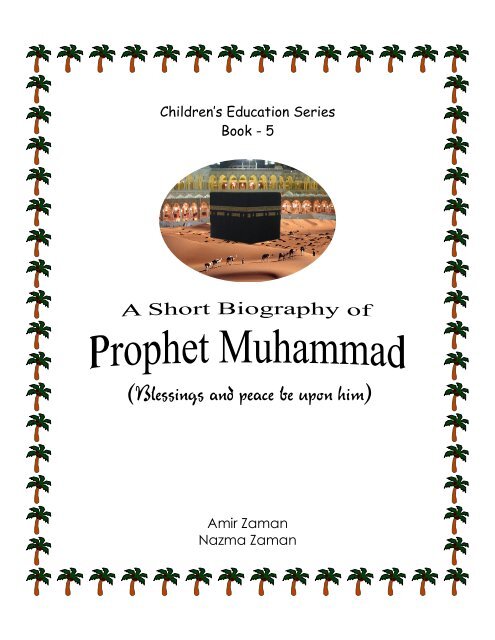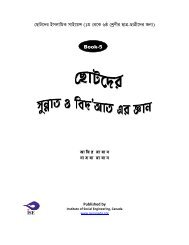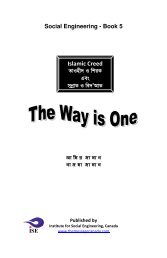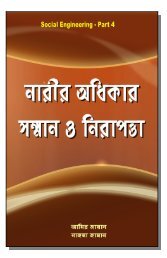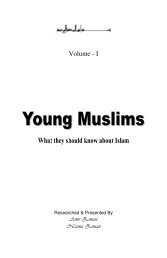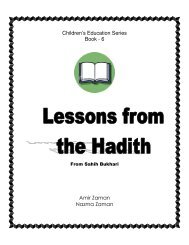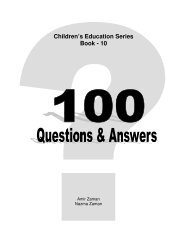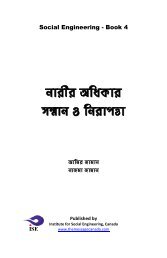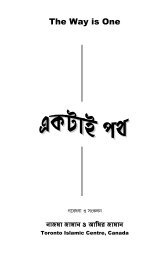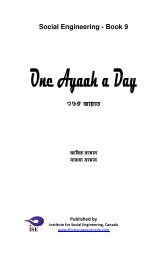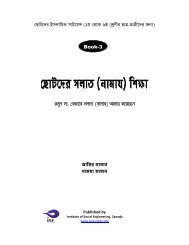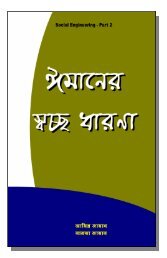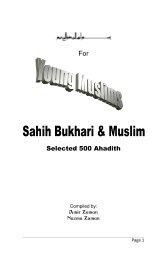05) A short Biography of Prophet Muhammad - The Message
05) A short Biography of Prophet Muhammad - The Message
05) A short Biography of Prophet Muhammad - The Message
You also want an ePaper? Increase the reach of your titles
YUMPU automatically turns print PDFs into web optimized ePapers that Google loves.
Children’s Education Series<br />
Book - 5<br />
(Blessings and peace be upon him)<br />
Amir Zaman<br />
Nazma Zaman
“Assalamu-Alaikum” Peace be upon you<br />
Amir Zaman<br />
Nazma Zaman<br />
Email: amiraway@hotmail.com<br />
www.themessagecanada.com<br />
1 st Edition: July 2012<br />
Price: $2<br />
ISE<br />
Published by<br />
Institute <strong>of</strong> Social Engineering, Canada<br />
www.themessagecanada.com<br />
3
Preface<br />
Muslims all over the world follow the religion <strong>of</strong> Islam<br />
(Deen-i-Islam). Islam is the religion chosen by Allah<br />
(SWT) and no other religion is acceptable to Allah<br />
(SWT).<br />
<strong>The</strong> religion <strong>of</strong> Islam as we know it and follow, was<br />
propagated, on the commands and guidance <strong>of</strong> Allah<br />
(through the Holy Qur’an), by His last <strong>Prophet</strong> and<br />
Messenger, <strong>Muhammad</strong> (Allah’s blessings and peace be<br />
upon him).<br />
<strong>Muhammad</strong> (bpuh) was born in Mecca (now in Saudi<br />
Arabia) in 571 C.E. He was an honest and righteous<br />
person respected by all in his society. Allah bestowed<br />
<strong>Prophet</strong>hood on him in 610 C.E. and he (<strong>Muhammad</strong>)<br />
struggled very hard for 23 years until his death in<br />
Medina in 632 C.E. to establish the religion <strong>of</strong> Islam.<br />
<strong>The</strong> holy Qur’an we read now for guidance in all<br />
matters <strong>of</strong> our life was revealed by Allah on<br />
<strong>Muhammad</strong> (bpuh) through the angel Gabriel for<br />
4
guidance <strong>of</strong> all humans, not only Muslims. His life as we<br />
know through his biographies and Sunnah (Hadith) was<br />
full <strong>of</strong> struggle, sufferings, triumphs, piety, sacrifice,<br />
love and affection, greatness, honor, etc. <strong>Muhammad</strong>’s<br />
(bpuh) life is the best role model for emulating for<br />
earthly life as well as for success in the life after<br />
death. He is best <strong>of</strong> all the great personalities that<br />
worked on the face <strong>of</strong> the earth. We must know about<br />
him and follow his footsteps so that we may train us to<br />
be good Muslims to be rewarded by Allah (SWT) in<br />
both the worlds.<br />
With this end in view, we are now presenting a <strong>short</strong><br />
biography <strong>of</strong> our beloved <strong>Prophet</strong> <strong>Muhammad</strong> (bpuh) in<br />
the pages that follow.<br />
Source <strong>of</strong> information: Ar-Raheeq Al-Makhtum<br />
(<strong>Biography</strong> <strong>of</strong> the Noble <strong>Prophet</strong> by Safiur-Rahman Al-<br />
Mubarakpuri. Publisher: Darussalam, Riyadh, Saudi<br />
Arabia, 1 st January 2002)<br />
Amir Zaman<br />
Nazma Zaman<br />
5
Grand Father: Abdul Muttalib. His 10 sons<br />
s<br />
<strong>The</strong> family <strong>of</strong> <strong>Prophet</strong> <strong>Muhammad</strong> (Allah’s blessings and<br />
peace be upon him) is called the Hashemite family after his<br />
grandfather Hashim bin ‘Abd Manaf. When Abdul Muttalib<br />
reached the age <strong>of</strong> boyhood, his uncle Al-Muttalib heard<br />
<strong>of</strong> him and went to Madinah to bring him to Makkah. When<br />
he saw him, tears filled his eyes and rolled down his<br />
cheeks, he embraced him and took him on his camel. <strong>The</strong><br />
boy, however, abstained from going with him to Makkah<br />
until he took his mother’s consent. Al-Muttalib asked her<br />
to send the boy with him to Makkah, but she refused. He<br />
managed to convince her saying: “Your son is going to<br />
Makkah to restore his father’s authority, and to live in the<br />
vicinity <strong>of</strong> the Sacred House.” <strong>The</strong>re in Makkah, people<br />
wondered at seeing Abdul Muttalib, and they considered<br />
him the slave <strong>of</strong> Muttalib. Al Muttalib said: “He is my<br />
nephew, the son on my brother Hashim.” <strong>The</strong> boy was<br />
brought up in Al Muttalib’s house.<br />
His grandfather Abdul Muttalib had 10<br />
sons, namely, Al-Harith, Az-Zubair, Abu<br />
Talib, Hamzah, Abu Lahab, Al-Ghidaq,<br />
Maqwam, Safar, Al-Abbas, and Abdullah<br />
(Father <strong>of</strong> <strong>Muhammad</strong>, Blessings and<br />
peace be upon him).<br />
6
Birth<br />
20/22 April, 571 C.E.: (9th Raby-al-awal) <strong>The</strong> <strong>Prophet</strong><br />
<strong>Muhammad</strong> [bpuh] was born in Makkah on Monday<br />
morning. His father, Abdullah Ibn Abdul Muttalib, died<br />
two months before his birth.<br />
His mother immediately sent someone to inform his<br />
grandfather Abdul Muttalib <strong>of</strong> the happy event.<br />
Happily he came to her, carried him to Al Kabah,<br />
prayed to Allah and thanked Him. Abdul Muttalib<br />
called the baby <strong>Muhammad</strong>, a name not then common<br />
among the Arabs. He circumcised him on his seventh<br />
day as was the custom <strong>of</strong> the Arabs.<br />
<strong>The</strong> first woman who suckled him<br />
after his mother was Thuwaibah, the<br />
freed slave <strong>of</strong> Abu Lahab, with her<br />
son, Masruh. She had suckled<br />
Hamzah bin Abdul Muttalib before<br />
and later Abut Salamah bin Abdul<br />
Asad Al Makhzumi.<br />
7
Death <strong>of</strong> Mother<br />
<strong>Prophet</strong> <strong>Muhammad</strong>’s [bpuh] stayed with Halimah until<br />
he was six.<br />
In respect <strong>of</strong> the memory <strong>of</strong> her late husband, Aminah<br />
decided to visit his grave in Yathrib (Madinah). She<br />
set out to cover a journey <strong>of</strong> 500 kilometers with her<br />
orphan boy, her father-in-law Abdul Muttalib, and a<br />
woman servant Umm Aiman. She spent a month there<br />
and then made her way back to Makkah. On the route,<br />
she suffered a severe illness and died in Abwa on the<br />
road between Makkah and Madinah.<br />
8
Death <strong>of</strong> Grandfather<br />
When <strong>Muhammad</strong> [bpuh] was eight years old, his<br />
grandfather Abdul Muttalib passed away in Makkah.<br />
<strong>The</strong> charge <strong>of</strong> the <strong>Prophet</strong> [Blessings and Peace be<br />
upon him] now passed on to his uncle Abu Talib.<br />
Abu Talib took the responsibility <strong>of</strong> his nephew in the<br />
best way. He put him with his children and preferred<br />
him to them. He singled the boy out with great respect<br />
and high esteem. Abu Talib remained for forty years<br />
cherishing his nephew and extending all possible<br />
protection and support to him.<br />
His relations with the others were determined in the<br />
light <strong>of</strong> the treatment they showed to the <strong>Prophet</strong><br />
(bpuh).<br />
A trade journey to Syria<br />
S<br />
At the age <strong>of</strong> twelve, <strong>Muhammad</strong><br />
[bpuh] traveled to Syria along with his<br />
uncle Abu Talib on a trading mission.<br />
9
Marriage to Khadijah (RA)<br />
When he returned to Makkah, Khadijah noticed, in her<br />
money, more pr<strong>of</strong>its and blessings than she used to.<br />
Her hireling also told her <strong>of</strong> <strong>Muhammad</strong>’s good<br />
manners, honesty, deep thought, sincerity and faith.<br />
She realized that she homed at her target. Many<br />
prominent men had asked for her hand in marriage but<br />
she always spurned their advances. She disclosed her<br />
wish to her friend Nafisa, daughter <strong>of</strong> Maniya, who<br />
immediately went to <strong>Muhammad</strong> (Peace be upon him)<br />
and broke the good news to him. He agreed and<br />
requested his uncles to go to Khadijah’s uncle and talk<br />
on this issue. Subsequently, they were married. <strong>The</strong><br />
marriage contract was witnessed by Bani Hashim and<br />
the heads <strong>of</strong> Mudar. This took place after the<br />
<strong>Prophet</strong>’s return from Syria. He gave her twenty<br />
camels as dowry. She was, then, forty years old and<br />
was considered as the best woman <strong>of</strong> her folk in<br />
lineage, fortune and wisdom. She was the first woman<br />
whom the Messenger <strong>of</strong> Allah (bpuh) married. He did<br />
not get married to any other until she had died.<br />
10
Khadijah bore all his children, except Ibrahim: Al-<br />
Qasim, Zainab, Ruqaiyah, Umm Kulthum, Fatimah and<br />
‘Abdullah who was called Taiyib and Tahir. All his sons<br />
died in their childhood and all the daughters except<br />
Fatimah died during his lifetime. Fatimah died six<br />
months after his death. All his daughters witnessed<br />
Islam, embraced it, and emigrated to Madinah.<br />
Sons and Daughters<br />
<strong>The</strong> <strong>Prophet</strong> <strong>Muhammad</strong> [bpuh] and Khadijah (RA) had<br />
4 daughters (Zainab, Ruqaiyah, Umm Kulthum &<br />
Fatimah (RA) and 2 sons (Qasim & Abdullah). Sadly,<br />
both sons died very young.<br />
11
Gabriel brings down the Revelation<br />
(1st Time)<br />
When <strong>Prophet</strong> <strong>Muhammad</strong> [bpuh] reached the age <strong>of</strong><br />
40, Angel Gabriel (Jibreel) came to him from God in<br />
the cave <strong>of</strong> Hira with the first revelation <strong>of</strong> the Holy<br />
Qur’an on the 21st. Ramadan at night with Surah Alaq,<br />
ayat 1-3.<br />
“Read! In the Name <strong>of</strong> your Lord, Who has created (all<br />
that exists), has created man from a clot (a piece <strong>of</strong><br />
thick coagulated blood). Read! And your Lord is the<br />
Most Generous.’” [96:1-3]<br />
<strong>The</strong> <strong>Prophet</strong> started to pr<strong>of</strong>ess Islam (secretly) to<br />
the Makkans who were idol worshippers. <strong>The</strong> Makkan<br />
leaders did not like it. <strong>The</strong>y started persecuting the<br />
new Muslims.<br />
ٱقۡرَأۡ بِٱسۡمِ رَب ِّكَ ٱل َّذِى<br />
خَلَقَ (١) خَلَقَ ٱلۡإِنسَٰنَ<br />
مِنۡ عَلَقٍ<br />
وَرَب ُّكَ ٱلۡأَآۡرَمُ<br />
عَل َّمَ بِٱلۡقَلَمِ<br />
(٢) ٱقۡرَأۡ<br />
(٣) ٱل َّذِى<br />
( ٤)<br />
12
<strong>The</strong> Early Converts to Islam<br />
Khadijah, the <strong>Prophet</strong>’s wife, was the first to enter the<br />
fold <strong>of</strong> Islam followed by his freed slave Zaid bin<br />
Harithah, his cousin, ‘Ali bin Abi Talib, who had been living<br />
with him since his early childhood, and next came his<br />
intimate friend Abu Bakr As-Siddiq (Abu Bakr the truth<br />
verifier). He invited whomever he had confidence in to<br />
Islam, such as ‘Uthman bin ‘Affan Al-Umawi, Az-Zubair bin<br />
‘Awwam Al-Asadi, ‘Abdur Rahman bin ‘Awf, Sa‘d bin Abi<br />
Waqqas, Az-Zuhri and Talhah bin ‘Ubaidullah At- Tamimy.<br />
Those eight men constituted the forerunners and more<br />
specifically the vanguard <strong>of</strong> the new faith in Arabia. Among<br />
the early Muslims were Bilal bin Rabah (the Abyssinian),<br />
Abu ‘Ubaidah bin Al-Jarrah from Bani Harith bin Fahr (the<br />
most trustworthy <strong>of</strong> the Muslim Nation), Abu Salamah bin<br />
‘Abd Al-Asad, Al-Arqam bin Abi Al-Arqam from the tribe<br />
<strong>of</strong> Makhzum, ‘Uthman bin Maz‘oun and his two brothers<br />
Qudama and ‘Abdullah, ‘Ubaidah bin Al-Harith bin Al-<br />
Muttalib bin ‘Abd Munaf, Sa‘id bin Zaid Al-‘Adawi and his<br />
wife Fatimah - daughter <strong>of</strong> Al-Khattab (the sister <strong>of</strong><br />
‘Umar bin Al-Khattab), Khabbab bin Al-Aratt, ‘Abdullâh bin<br />
Mas‘ud Al-Hadhali and many others. <strong>The</strong>se were the<br />
Muslim predecessors. <strong>The</strong>y belonged to various sects <strong>of</strong><br />
Quraish. Ibn Hisham, a biographer <strong>of</strong> the <strong>Prophet</strong>, counted<br />
them to be more than forty.<br />
13
1 st<br />
st Migration to Abyssinia (Ethiopia)<br />
<strong>The</strong> series <strong>of</strong> persecutions started late in the fourth<br />
year <strong>of</strong> <strong>Prophet</strong>hood, slowly at first, but steadily<br />
accelerated and worsened day by day and month by<br />
month until the situation got so extremely grave and<br />
no longer tolerable that in the middle <strong>of</strong> the fifth<br />
year, the Muslims began to seriously think <strong>of</strong> feasible<br />
ways liable to avert the painful tortures meted out to<br />
them.<br />
In Rajab <strong>of</strong> the fifth year <strong>of</strong> <strong>Prophet</strong>hood, a group <strong>of</strong><br />
twelve men and four women left for Abyssinia<br />
(Ethiopia). Among the emigrants were 'Uthman bin<br />
'Affan and his wife Ruqaiyah [the daughter <strong>of</strong> the<br />
<strong>Prophet</strong> (bpuh)]. With respect to these two emigrants,<br />
the <strong>Prophet</strong> (bpuh) said:<br />
"<strong>The</strong>y are the first people to migrate in the cause <strong>of</strong><br />
Allah after Abraham and Lot (peace be upon them)."<br />
14
Social Boycott<br />
Four events <strong>of</strong> special significance occurred within<br />
less than four weeks — the conversion <strong>of</strong> Hamzah, the<br />
conversion <strong>of</strong> ‘Umar, <strong>Muhammad</strong>’s (Peace be upon him)<br />
refusal to negotiate any sort <strong>of</strong> compromise and then<br />
the pact drawn up between Banu Muttalib and Banu<br />
Hashim to immunize <strong>Muhammad</strong> (Peace be upon him)<br />
and shield him against any treacherous attempt to kill<br />
him. <strong>The</strong> polytheists were baffled and at a loss as to<br />
what course they would follow to rid themselves <strong>of</strong><br />
this obstinate and relentless obstacle that had<br />
appeared to shatter to pieces their whole tradition <strong>of</strong><br />
life. <strong>The</strong>y had already been aware that if they killed<br />
<strong>Muhammad</strong> (Peace be upon him) the blood would surely<br />
flow pr<strong>of</strong>usely in the valleys <strong>of</strong> Makkah and they would<br />
certainly be exterminated. Taking this dreadful<br />
prospect into consideration, they grudgingly resorted<br />
to a different iniquitous courses that would not imply<br />
murder.<br />
15
Three years in the Valley Shi‘b <strong>of</strong> Abu Talib<br />
<strong>The</strong> pagans <strong>of</strong> Makkah held a meeting in a place called<br />
Wadi Al-Muhassab, and formed a confederation hostile to<br />
both Bani Hashim and Bani Al-Muttalib. <strong>The</strong>y decided not<br />
to have any business dealings with them nor any sort <strong>of</strong><br />
inter-marriage. Social relations, visits and even verbal<br />
contacts with <strong>Muhammad</strong> (bpuh) and his supporters would<br />
discontinue until the <strong>Prophet</strong> (bpuh) was given up to them<br />
to be killed. <strong>The</strong> articles <strong>of</strong> their proclamation, which had<br />
provided for merciless measures against Bani Hashim, were<br />
committed to writing by an idolater, Bagheed bin ‘Amir bin<br />
Hashim and then suspended in Al-Ka‘bah.<br />
Abu Talib wisely and quietly took stock <strong>of</strong> the situation and<br />
decided to withdraw to a valley on the eastern outskirts <strong>of</strong><br />
Makkah (Shi’b <strong>of</strong> Abu Talib). After three years <strong>of</strong><br />
blockade, in Muharram, the tenth year <strong>of</strong> <strong>Muhammad</strong>’s<br />
mission, the pact was broken. Al-Mut‘im went to the Ka’bah<br />
to see the parchment and there he did discover that it was<br />
eaten away by ants and nothing was left save the part<br />
bearing (in the Name <strong>of</strong> Allah).<br />
<strong>The</strong> proclamation was thus abrogated, and <strong>Muhammad</strong><br />
(bpuh) and the other people were permitted to leave Ash-<br />
Shi’b and return home.<br />
16
Abu Talib's death<br />
<strong>The</strong> year <strong>of</strong> Grief<br />
In Rajab, the tenth year <strong>of</strong> the <strong>Prophet</strong>hood, Abu<br />
Talib fell ill and passed away, six months after leaving<br />
the confinement at Ash-Shi’b. In another version, Abu<br />
Talib breathed his last in Ramadan, three days prior to<br />
the death <strong>of</strong> Khadijah (May Allah be pleased with her).<br />
Khadijah passes away to the mercy <strong>of</strong> Allah<br />
Only two months after the death <strong>of</strong> his uncle, did the<br />
Messenger <strong>of</strong> Allah (bpuh) experience another great<br />
personal loss viz., the Mother <strong>of</strong> believers, his wife<br />
Khadijah, passed away in Ramadan <strong>of</strong> the tenth year <strong>of</strong><br />
his <strong>Prophet</strong>hood, when she was sixty-five years old,<br />
and he was fifty. Khadijah was in<br />
fact a blessing <strong>of</strong> Allah for the<br />
<strong>Prophet</strong> (bpuh). She, for twenty five<br />
years, shared with him the toils and<br />
trials <strong>of</strong> life, especially in the first<br />
ten years <strong>of</strong> his ministry <strong>of</strong><br />
<strong>Prophet</strong>hood.<br />
17
Visit to Taif<br />
In Shawwal (in the last <strong>of</strong> May or in the beginning <strong>of</strong><br />
June 619 C.E.), ten years after receiving his mission<br />
from his Lord, the <strong>Prophet</strong> (bpuh) set out towards At-<br />
Taif, about 60 kilometres from Makkah, in the<br />
company <strong>of</strong> his freed slave Zaid bin Haritha inviting<br />
people to Islam. But contrary to his expectations, the<br />
general atmosphere was terribly hostile. He<br />
approached the family <strong>of</strong> ‘Umair, who were reckoned<br />
amongst the nobility <strong>of</strong> the town. But, to his<br />
disappointment, all <strong>of</strong> them turned deaf ear to his<br />
message and used abusive language as regards the<br />
noble cause he had been striving for. He was stoned<br />
and was bleeding from head to toe.<br />
For ten days he stayed there delivering his message to<br />
several people, one after another, but all to no<br />
purpose. Heart-broken and depressed, <strong>Muhammad</strong><br />
(bpuh) set out on the way back to Makkah. When he<br />
reached Qarn Al-Manazil, Allah, the Almighty sent him<br />
angel Gabriel together with the angel <strong>of</strong> mountains.<br />
<strong>The</strong> latter asked the <strong>Prophet</strong> (Peace be upon him) for<br />
permission to bury Ta’if between two mountains. But<br />
18
<strong>Prophet</strong> (bpuh) said: “No, I hope that Allah will let<br />
them beget children who will worship Allah Alone, and<br />
will worship none besides Him.” (Shahih Bukhari and<br />
Shahih Muslim).<br />
Allah’s Messenger (bpuh) was then refreshed and his<br />
heart was set at rest in the light <strong>of</strong> that invisible<br />
Divinely provided aid. He proceeded to Wadi Nakhlah<br />
where he stayed for a few days. During his stay there,<br />
Allah sent him a company <strong>of</strong> jinns who listened to him<br />
reciting the Noble Qur’an.<br />
19
Isra and Miraj<br />
Isra and Miraj (<strong>The</strong> night Journey to Jerusalem and the<br />
Ascent to the 7th Heaven) took place. <strong>The</strong> <strong>Prophet</strong><br />
(bpuh) was taken from Makkah to Jerusalem (Temple<br />
Mount) on a horse-like creature with wings, called Buraq,<br />
brought to him by the Angel Gabriel. From the Temple<br />
Mount in Jerusalem, the <strong>Prophet</strong> [Blessings and Peace be<br />
upon him], accompanied by Gabriel, went up to the Seven<br />
Heavens and came into the Divine Presence.<br />
<strong>Prophet</strong> <strong>Muhammad</strong> (bpuh) saw Gabriel in his real<br />
appearance twice: once on earth, and once at Sidratul<br />
Muntaha (Night Journey and Ascension). (Sahih Bukhari).<br />
Also the <strong>Prophet</strong> (bpuh) saw two manifest rivers, the<br />
Nile and the Euphrates – and two hidden ones. He had<br />
the opportunity to see Malik, the keeper <strong>of</strong> Hell, with a<br />
cheerless frowning face. He saw Paradise and the Fire.<br />
He saw those who unjustly consume the property <strong>of</strong><br />
orphans.<br />
20
<strong>The</strong> Emigration <strong>of</strong> the <strong>Prophet</strong><br />
A plot was hatched in Makkah to kill the <strong>Prophet</strong><br />
[bpuh]. To save his life, the <strong>Prophet</strong> [bpuh] went away<br />
to Madinah, which marked the beginning <strong>of</strong> the Islamic<br />
calendar known as Hijrah (12th or 13th Sept. 622<br />
C.E.). <strong>The</strong> <strong>Prophet</strong> (Blessings and Peace be upon him)<br />
received a warm welcome from the people <strong>of</strong> Madinah.<br />
Change <strong>of</strong> Qiblah: <strong>The</strong> prophet and his followers used<br />
to face Jerusalem while (praying to Allah daily.)<br />
Jerusalem was their Qiblah (direction) for prayers.<br />
Change <strong>of</strong> Qiblah from al-Aqsa mosque in Jerusalem to<br />
the Kabah in Makkah. Fasting (Siyam) enjoined on the<br />
believers.<br />
21
<strong>The</strong> Battle B<br />
<strong>of</strong> Badr<br />
(17 Ramadan, 2 A.H.): 1300 strong army <strong>of</strong> Makkans<br />
came all the way to Madinah to attack the 313-317<br />
Muslims soldiers. An outnumbered Muslim army<br />
defeated them at Badr near Madinah. <strong>The</strong> great<br />
tyrant Abu Jahl was killed. In this battle, 14 Muslims<br />
soldiers were killed & 70 Polytheists were killed.<br />
<strong>The</strong> battle <strong>of</strong> Badr is the first decisive battle in the<br />
history <strong>of</strong> Islam.<br />
<strong>The</strong> Muslim army was made up <strong>of</strong> 300-317 men, 82-86<br />
Emigrants, 61 from Aws and 170 from Khazraj. <strong>The</strong>y<br />
were not well-equipped nor adequately prepared. <strong>The</strong>y<br />
had only two horses belonging to Az-Zubair bin Al-<br />
‘Awwam and Al-Miqdad bin Al-Aswad Al-Kindi, 70<br />
camels, one for two or three men to ride alternatively.<br />
<strong>The</strong> <strong>Prophet</strong> (bpuh) used to pray to<br />
his Lord ceaselessly persistently day<br />
and night to come to their succor.<br />
When the fierce engagement<br />
22
grew too hot, he again began to supplicate his Lord<br />
saying: · “O Allah! Should this group (<strong>of</strong> Muslims) be<br />
defeated today, You will no longer be worshipped.”<br />
He continued to call out to his Lord, stretching forth<br />
his hands and facing Al-Qiblah, until his cloak fell <strong>of</strong>f<br />
his shoulders. <strong>The</strong>n Abu Bakr came, picked up the<br />
cloak, and put it back on his shoulders and said: “O<br />
<strong>Prophet</strong> <strong>of</strong> Allah, you have cried out enough to your<br />
Lord. He will surely fulfill what He has promised you.”<br />
Immediate was the response from Allah, Who sent<br />
down angels from the heavens for the help and<br />
assistance <strong>of</strong> the <strong>Prophet</strong> (bpuh) and his companions.<br />
In the Noble Qur’an Allah said:<br />
“Verily, I am with you, so keep firm those who have<br />
believed. I will cast terror into the hearts <strong>of</strong> those<br />
who have disbelieved.” [8:12]<br />
Allah, the All-Mighty, also inspired another message to<br />
His Messenger, saying:<br />
“I will help you with a thousand <strong>of</strong> the angels each<br />
behind the other (following one another) in<br />
succession.” [8:9]<br />
23
Fasting made obligatory<br />
Fasting in Ramadan was established as an obligatory<br />
observance in the year 2 A.H., appended by the duty<br />
imposed upon Muslims <strong>of</strong> paying Zakat (poor-due) in<br />
order to alleviate the burden <strong>of</strong> the needy Emigrants.<br />
24
<strong>The</strong> Battle <strong>of</strong> Uhud<br />
(7 Shawwal, 3 A.H.): <strong>The</strong> Muslims were defeated at<br />
Uhud outside Madinah. <strong>The</strong> <strong>Prophet</strong> [bpuh] himself was<br />
wounded and one <strong>of</strong> his teeth broken. 70 Sahaba<br />
including his uncle Hamza (RA) were killed in this<br />
battle.<br />
<strong>The</strong> <strong>Prophet</strong> (bpuh) divided his army into three<br />
battalions: 1. Al-Muhajireen, 2. Al-Ansari-Aws, and 3.<br />
Al-Ansari-Khazraj. <strong>The</strong> army consisted <strong>of</strong> a thousand<br />
fighters; a hundred <strong>of</strong> them armored; another fifty<br />
horsemen.<br />
He appointed Ibn Umm Maktum to lead the people in<br />
prayer in Madinah. Departure was announced and the<br />
army moved northwards with the two (Sa‘d bin Mu’adh<br />
and Sa’d bin ‘Ubadah), who were armored, running in<br />
front <strong>of</strong> the army.<br />
Upon passing along Al-Wada‘ mountain trail he saw a<br />
well-armed battalion, which were detached from the<br />
main body <strong>of</strong> the army.<br />
25
Passing the night between Uhud and Madinah:<br />
As night fell upon them there, they performed both<br />
the sunset and the evening prayers and spent the night<br />
there as well. Fifty people were chosen to guard the<br />
camp and go round it. <strong>Muhammad</strong> bin Maslama Al-<br />
Ansari, the hero <strong>of</strong> the brigade <strong>of</strong> Ka‘b bin Al-Ashraf,<br />
was in charge <strong>of</strong> the guards. Whereas Dhakwan bin<br />
‘Abd Qais undertook the responsibility <strong>of</strong> guarding the<br />
<strong>Prophet</strong> (bpuh), in particular.<br />
<strong>The</strong> rebellion <strong>of</strong> 'Abdallah bin Ubai and his<br />
followers:<br />
At the end <strong>of</strong> the night and just before it was<br />
daybreak, the <strong>Prophet</strong> (Peace be upon him) moved and<br />
when he got to Ash-Shawt, he observed the dawn<br />
prayer. <strong>The</strong>re he was close enough to the enemy that<br />
they could see one another. It was there that<br />
‘Abdullah bin Ubai — the hypocrite — rebelled against<br />
the Muslims. One-third <strong>of</strong> the army withdrew with him<br />
— that is to say three hundred fighters. He said, “We<br />
do not know why we shall kill ourselves.”<br />
He claimed that his withdrawal was no more than<br />
showing protest against the Messenger <strong>of</strong> Allah (Peace<br />
26
e upon him) who had already refused his opinion and<br />
accepted that <strong>of</strong> the others.<br />
<strong>The</strong> remainder <strong>of</strong> the Islamic Army is on the move<br />
to Uhud:<br />
With the remainder <strong>of</strong> fighters, the Messenger <strong>of</strong><br />
Allah (Peace be upon him) moved towards the enemy.<br />
After the rebellion and withdrawal <strong>of</strong> the hypocrites,<br />
the number <strong>of</strong> soldiers was reduced to seven hundred<br />
only.<br />
Assassination <strong>of</strong> Asadullah (the Lion <strong>of</strong> Allah)<br />
Hamzah bin ‘Abdul Muttalib:<br />
Hamzah bin ‘Abdul Muttalib displayed wonderful acts<br />
<strong>of</strong> bravery against the overwhelming odds which stood<br />
unparallel and created worry and confusion in the<br />
disbelieving army. Heroes dispersed <strong>of</strong>f his way as if<br />
they had been tree-leaves blown away by strong wind.<br />
It was Allah’s Will that he be murdered when he was<br />
at the top. He was not killed in a face-to-face fight on<br />
the battlefield — in the normal way by which heroes<br />
die — but rather stealthily assassinated as was the<br />
custom <strong>of</strong> killing generous and noble men that were<br />
impossible to kill in an honorable face to face fight.<br />
27
Al-Hudaibiyah Treaty<br />
(Dhul Qadah, 6 A.H.): <strong>The</strong> <strong>Prophet</strong> [bpuh] signed the<br />
Peace Treaty with the Quraish at Hudaybiyah, near<br />
Makkah, which the Qur’an calls “a clear victory.”<br />
This is supported by the fact that the <strong>Prophet</strong> (bpuh)<br />
went out to Al-Hudaibiyah with only 1,400 men, but<br />
when he set out to liberate Makkah, two years later,<br />
he had 10,000 men with him.<br />
When Quraish saw the firm determination <strong>of</strong> the<br />
Muslims to shed the last drop <strong>of</strong> blood for the<br />
defence <strong>of</strong> their Faith, they came to their senses and<br />
realized that <strong>Muhammad</strong>’s followers could not be<br />
cowed down by these tactics. After some further<br />
interchange <strong>of</strong> messages they agreed to conclude a<br />
treaty <strong>of</strong> reconciliation and peace with the Muslims.<br />
<strong>The</strong> clauses <strong>of</strong> the said treaty go as follows:<br />
1. <strong>The</strong> Muslims shall return this time<br />
and come back next year, but they<br />
shall not stay in Makkah for more<br />
than three days.<br />
28
2. <strong>The</strong>y shall not come back armed but can bring with<br />
them swords only sheathed in scabbards and these<br />
shall be kept in bags.<br />
3. War activities shall be suspended for ten years,<br />
during which both parties will live in full security and<br />
neither will raise sword against the other.<br />
4. If anyone from Quraish goes over to <strong>Muhammad</strong><br />
(Blessings and peace be upon him) without his<br />
guardian’s permission, he should be sent back to<br />
Quraish, but should any <strong>of</strong> <strong>Muhammad</strong>’s followers<br />
return to Quraish, he shall not be sent back.<br />
5. Whosoever wishes to join <strong>Muhammad</strong> (Peace be upon<br />
him), or enter into treaty with him, should have the<br />
liberty to do so; and likewise, whosoever wishes to join<br />
Quraish, or enter into treaty with them, should be<br />
allowed to do so.<br />
29
<strong>The</strong> <strong>Prophet</strong>’s [Blessings and Peace be<br />
upon him] plans to spread the <strong>Message</strong><br />
<strong>of</strong> Islam beyond Arabia<br />
(Late in the 6 A.H.): <strong>The</strong> <strong>Prophet</strong> [bpuh] sent letters<br />
and couriers to the kings <strong>of</strong> Abyssinia (Ethiopia),<br />
Egypt, Persia, Rome, Bahrain, Yamamah, Damascus, and<br />
Oman inviting them to accept the <strong>Message</strong> <strong>of</strong> Islam.<br />
1. A Deputation to Abyssinia (Ethiopia):<br />
Negus, king <strong>of</strong> Abyssinia (Ethiopia), his name was<br />
Ashama bin Al-Abjar, received the <strong>Prophet</strong>’s message,<br />
despatched by Amr bin Omaiyah Ad-Damari, which At-<br />
Tabari referred to, either late in the sixth year or<br />
early in the seventh year A.H.<br />
2. Letter to the Vicegerent <strong>of</strong> Egypt, called Muqawqas:<br />
<strong>The</strong> <strong>Prophet</strong> (bpuh) wrote to Juraij bin Matta, called<br />
Muqawqas, vicegerent <strong>of</strong> Egypt and Alexandria saying:<br />
“In the Name <strong>of</strong> Allah, the Most Beneficent, the Most<br />
Merciful. From <strong>Muhammad</strong> slave <strong>of</strong> Allah and His<br />
30
Messenger to Muqawqas, vicegerent <strong>of</strong> Egypt. Peace<br />
be upon him who follows true guidance. <strong>The</strong>reafter, I<br />
invite you to accept Islam. <strong>The</strong>refore, if you want<br />
security, accept Islam. If you accept Islam, Allah, the<br />
Sublime, shall reward you doubly. But if you refuse to<br />
do so, you will bear the burden <strong>of</strong> the transgression <strong>of</strong><br />
all the Copts.<br />
3. A Letter to Chosroes, Emperor <strong>of</strong> Persia:<br />
4.<strong>The</strong> Envoy to Caesar, King <strong>of</strong> Rome:<br />
5. A Letter to Mundhir bin Sawa, Governor <strong>of</strong> Bahrain:<br />
6. A Letter to Haudha bin ‘Ali, Governor <strong>of</strong> Yamama:<br />
7. A Letter to Harith bin Abi Shamir Al-Ghassani, King<br />
<strong>of</strong> Damascus:<br />
8. A Letter to the King <strong>of</strong> ‘Oman,<br />
Jaifer, and his Brother ‘Abd Al-<br />
Jalandi:<br />
31
<strong>The</strong> Conquest <strong>of</strong> Khaibar<br />
(Muharram 7 A.H.): 1400 Muslim soldiers took part in<br />
this battle. Khaibar was a spacious strongly fortified<br />
territory, studded with castles and farms, lying at a<br />
distance <strong>of</strong> 60-80 miles north <strong>of</strong> Madinah, now a<br />
village known for its uncongenial climate.<br />
<strong>The</strong> hypocrites and people <strong>of</strong> weak heart had hung<br />
back from joining the true Muslims in Al-Hudaibiyah<br />
campaigns. So now Allah, the All-Mighty, inculcated<br />
the following words in His <strong>Prophet</strong>’s ears: “Those who<br />
lagged behind will say, when you set forth to take the<br />
spoils, ‘Allow us to follow you.’ <strong>The</strong>y want to change<br />
Allah’s Words. Say: ‘You shall not follow us; thus Allah<br />
has said beforehand.’ <strong>The</strong>n they will say: ‘Nay, you envy<br />
us.’ Nay, but they understand not except a little.”<br />
[48:15]<br />
For this reason, the <strong>Prophet</strong> (bpuh)<br />
invited only those who were willing to<br />
fight in the cause <strong>of</strong> Allah to<br />
accompany him in his march against<br />
Khaibar. 1400 men only, had sworn<br />
allegiance in response to his call.<br />
32
<strong>The</strong> Battle <strong>of</strong> Mu’tah<br />
(Jumada Al-Ula 8 A.H.): It was the most significant<br />
and fierce battle during the lifetime <strong>of</strong> the Messenger<br />
(bpuh). Mu’tah was a village on the borders <strong>of</strong> Greater<br />
Syria.<br />
<strong>The</strong> <strong>Prophet</strong> (bpuh) had sent Al-Harith bin 'Umair Al-<br />
Azdi on an errand to carry a letter to the ruler <strong>of</strong><br />
Busra. On his way, he was intercepted by Sharhabeel<br />
bin 'Amr Al-Ghassani, the governor <strong>of</strong> Al-Balqa' and a<br />
close ally to Caesar, the Byzantine Emperor. Al-Harith<br />
was tied and beheaded by Al-Ghassani.<br />
Killing envoys and messengers used to be regarded as<br />
the most awful crime, and amounted to the degree <strong>of</strong><br />
declaration <strong>of</strong> war. <strong>The</strong> <strong>Prophet</strong> (bpuh) was shocked on<br />
hearing the news and ordered that a large army <strong>of</strong><br />
3000 men be mobilized and dispatched to the north to<br />
discipline the transgressors. It was the largest Muslim<br />
army ever mobilized on this scale except in the<br />
process <strong>of</strong> the Confederates Battle.<br />
33
<strong>The</strong> Conquest <strong>of</strong> Makkah<br />
(20 Ramadan, 8 A.H.) (630 CE): Makkah surrendered<br />
without a fight. <strong>The</strong> <strong>Prophet</strong> [bpuh] forgave his<br />
Makkan opponents. 360 idols were all taken away from<br />
inside the Kabah & destroyed, and all <strong>of</strong> the people<br />
there accepted Islam.<br />
Ibn Al-Qaiyim described the conquest <strong>of</strong> Makkah as<br />
the greatest one by which Allah honored His religion,<br />
Messenger, soldiers and honest party. He thereby<br />
rescued the Sacred House, whose guidance all people<br />
seek. It was the greatest propitious event in heaven<br />
and on earth. It was the most significant prelude to a<br />
new era that was to witness the great march <strong>of</strong><br />
Islamization and the entry <strong>of</strong> people into the fold <strong>of</strong><br />
Islam in huge hosts. It provided an ever-shining face<br />
and a most glowing source <strong>of</strong> inspiration to the whole<br />
earth.<br />
34
Multitudes embrace the Religion <strong>of</strong><br />
Allah<br />
(9 A.H. and 10 A.H.): Islam was accepted by many<br />
Arabian tribes.<br />
<strong>The</strong> Arabs used to ascribe their Islamization to the<br />
conquest. <strong>The</strong>y would say: ‘Leave him alone to face his<br />
people. If he were a truthful <strong>Prophet</strong> he would<br />
overcome them.’ So when the conquest, took place,<br />
peoples hastened to declare their Islam. My father<br />
was the quickest <strong>of</strong> all my people to embrace Islam.<br />
Arriving at his people he said: ‘By Allah I have just<br />
verily been to the <strong>Prophet</strong> (bpuh). And he said:<br />
‘Perform so a prayer at such a time, and so and so<br />
prayers at such and such time. When the prayer<br />
time is due let one <strong>of</strong> you call for the prayer and<br />
appoint the most learned <strong>of</strong> the Qur’an among you to<br />
be an Imam (leader) <strong>of</strong> yours.<br />
<strong>The</strong> immense crowds <strong>of</strong> people who raced to embrace<br />
the religion <strong>of</strong> Allah and the great army which included<br />
ten thousand fighters in the invasion <strong>of</strong> the conquest<br />
35
<strong>of</strong> Makkah had grown big enough to include thirty<br />
thousand fighters sharing in Tabuk invasion. It was<br />
only in less than a year after the conquest <strong>of</strong> Makkah<br />
that this growth in Islamic army had taken place. A<br />
hundred thousand or a hundred and forty four<br />
thousand Muslim pilgrims shared in Hajjatul -Wada‘<br />
(i.e. Farewell Pilgrimage); it was such an enormous<br />
number <strong>of</strong> Muslims surging — as an ocean <strong>of</strong> men —<br />
round the Messenger <strong>of</strong> Allah (Peace be upon him) ,<br />
that the horizon echoed their voices and the expanses<br />
<strong>of</strong> land shook whereby while saying Labbaik (i.e. Lord,<br />
here we are worshipping), glorifying and magnifying<br />
Allah, and thanking Him.<br />
36
<strong>The</strong> Farewell Pilgrimage<br />
(Dhul Hijjah, 10 A.H.) (632 CE): <strong>The</strong> <strong>Prophet</strong> (bpuh)<br />
went for his Hajj. As he stood at Arafat to deliver his<br />
sermon, the very last verse <strong>of</strong> the Qur’an was revealed<br />
to him. (Sura Maida, ayah 3)<br />
After the accomplishment <strong>of</strong> the Call, the<br />
proclamation <strong>of</strong> the <strong>Message</strong>, and the establishment<br />
<strong>of</strong> a new society on the basis <strong>of</strong> ‘<strong>The</strong>re is no god but<br />
Allah,’ and on <strong>Muhammad</strong>’s mission, a secret call uprose<br />
in the heart <strong>of</strong> the Messenger <strong>of</strong> Allah (bpuh) telling<br />
him that his stay in the Lower World was about to<br />
terminate. That was clear in his talk to Mu‘adh whom<br />
he had dispatched to Yemen in the tenth year <strong>of</strong> Al-<br />
Hijra: “O Mu‘adh! You may not see me after this<br />
current year. You may even pass by this very Mosque<br />
<strong>of</strong> mine and my tomb.” Upon hearing that Mu‘adh cried<br />
for fear that he would part with the Messenger <strong>of</strong><br />
Allah (bpuh).<br />
Allah’s care was so bounteous as to let the <strong>Prophet</strong><br />
(bpuh) see the fruits <strong>of</strong> his Call for the sake <strong>of</strong> which<br />
37
he suffered various sorts <strong>of</strong> trouble for over twenty<br />
years. Those twenty years had elapsed actively. He<br />
used to spend his last days meeting, at the outskirts<br />
<strong>of</strong> Makkah, members <strong>of</strong> tribes and their<br />
representatives who used to consult him and learn the<br />
laws and legislation <strong>of</strong> Islam from him, and in return he<br />
used to exact their testimony that he had delivered<br />
trust and communicated the <strong>Message</strong> and counseled<br />
the people. <strong>The</strong> Messenger <strong>of</strong> Allah (bpuh) announced<br />
an intention to proceed with this blessed pilgrimage<br />
journey himself. Enormous crowds <strong>of</strong> people came to<br />
Madinah, all <strong>of</strong> whom seeking the guidance and<br />
Imamate <strong>of</strong> the Messenger <strong>of</strong> Allah (bpuh) in the<br />
pilgrimage (Al-Hajj).<br />
38
<strong>The</strong> Journey to Allah, the Sublime<br />
(Monday 12 Rabi-al Awwal, 11 A.H.) (632 CE): <strong>The</strong><br />
<strong>Prophet</strong> [bpuh] died at age 63, and his closest<br />
Companion, Abu Bakr (RA), succeeded him as the first<br />
Caliph (Khalifa) <strong>of</strong> Islam.<br />
Symptoms <strong>of</strong> farewell<br />
1. In Ramadan in the tenth year <strong>of</strong> Al-Hijra, he<br />
secluded himself for twenty days in contrast to ten,<br />
previously. 2. <strong>The</strong> angel Gabriel reviewed the Qur’an<br />
twice with him as against once in a year. 3. His words<br />
in the Farewell Pilgrimage (i.e., Hajj Al-Wida‘): “I do<br />
not know whether I will ever meet you at this place<br />
once again after this current year.” 5. <strong>The</strong> revelation<br />
<strong>of</strong> Surah An-Nasr <strong>of</strong> At-Tashreeq Days. When it was<br />
revealed to him, he realized that it was the parting<br />
time and that the Surah was an announcement <strong>of</strong> his<br />
approaching death.<br />
6. On the early days <strong>of</strong> Safar in the eleventh year <strong>of</strong><br />
Al-Hijra, the <strong>Prophet</strong> (bpuh) went out to Uhud and<br />
observed a farewell prayer to the martyrs. It looked<br />
39
like saying goodbye to both the dead and the living<br />
alike. He then ascended the pulpit and addressed<br />
the people saying: “I am to precede you and I have<br />
been made witness upon you. By Allah, you will meet me<br />
at the ‘Fountain’ very soon. I have been given the keys<br />
<strong>of</strong> worldly treasures. By Allah, I do not fear for you<br />
that you will turn polytheists after me. But I do fear<br />
that acquisition <strong>of</strong> worldly riches should entice you to<br />
strike at one another’s neck.” 7. One day, at midnight<br />
he went to Al-Baqee‘ cemetery, and implored Allah to<br />
forgive the martyrs <strong>of</strong> Islam.<br />
<strong>Prophet</strong>’s Wives<br />
1. Khadijah Bint Khuwailid: In Makkah — prior to<br />
Hijra — the <strong>Prophet</strong>’s household comprised him (bpuh)<br />
and his wife Khadijah bint Khuwailid. He was twentyfive<br />
and she was forty when they got married. She was<br />
the first woman he married. She was the only wife he<br />
had till she died. He had sons and daughters with her.<br />
None <strong>of</strong> their sons lived long. <strong>The</strong>y all died. <strong>The</strong>ir<br />
40
daughters were Zainab, Ruqaiya, Umm Kulthum and<br />
Fatimah.<br />
2. Sawdah bint Zam‘ah: He married her in Shawwal,<br />
in the tenth year <strong>of</strong> <strong>Prophet</strong>hood, a few days after the<br />
death <strong>of</strong> Khadijah. Prior to that, she was married to a<br />
paternal cousin <strong>of</strong> hers called As-Sakran bin ‘Amr.<br />
3. ‘Aishah bint Abu Bakr: He married her in the<br />
eleventh year <strong>of</strong> <strong>Prophet</strong>hood, a year after his<br />
marriage to Sawdah, and two years and five months<br />
before Al-Hijra. As a woman she was the most learned<br />
in jurisprudence and knowledgeable.<br />
4. Hafsah bint ‘Umar bin Al-Khattab: Her exhusband<br />
was Khunais bin Hudhafah As-Sahmi (RA) who<br />
died in the period between the battles <strong>of</strong> Badr and<br />
Uhud. <strong>The</strong> Messenger <strong>of</strong> Allah (bpuh) married her in<br />
the third year <strong>of</strong> Al-Hijra.<br />
41
<strong>Prophet</strong> <strong>Muhammad</strong>’s (bpuh)<br />
Last Sermon (Khutba)<br />
This sermon was delivered on the Ninth day <strong>of</strong> Dhul<br />
Hijja 10 A.H. in the ‘Uranah valley <strong>of</strong> Mount Arafat’ (in<br />
Makka). He went down the valley where a hundred and<br />
twenty-four or forty-four thousand people were<br />
gathering round him. <strong>The</strong>re he stood and delivered the<br />
following speech:<br />
O People! Listen to what I say. I do not know whether<br />
I will ever meet you at this place after this year. Your<br />
blood, your property and your honor are as sacred as<br />
this day, this month and this city (i.e. Makkah and the<br />
surrounding areas).<br />
“Behold! All practices <strong>of</strong> paganism and ignorance are<br />
now under my feet. <strong>The</strong> blood revenge <strong>of</strong> the Days <strong>of</strong><br />
Ignorance (pre-Islamic time) are remitted. <strong>The</strong> first<br />
claim on blood I abolish is that <strong>of</strong> Ibn Rabi’ah bin<br />
Harith who was being nursed in the tribe <strong>of</strong> Sa’d and<br />
whom Hudhail killed. Usury is forbidden, and I make a<br />
beginning by remitting the amount <strong>of</strong> interest which<br />
42
‘Abbas bin ‘Abdul-Muttalib has to receive. Verily, it is<br />
remitted entirely.<br />
"O people! Fear Allah concerning women. Verily you<br />
have taken them on the security <strong>of</strong> Allah and have<br />
made their persons lawful unto you by Words <strong>of</strong> Allah!<br />
It is incumbent upon them to honor their conjugal<br />
rights and, not to commit acts <strong>of</strong> impropriety which, if<br />
they do, you have authority to chastise them, yet not<br />
severely. If your wives refrain from impropriety and<br />
are faithful to you, clothe and feed them suitably.”<br />
"Verily, I have left among you the Book <strong>of</strong> Allah, if you<br />
hold fast to it, you shall never go astray." [Sahih<br />
Muslim 1/397]<br />
"O people, I am not succeeded by a <strong>Prophet</strong> and you<br />
are not succeeded by any nation. So I recommend you<br />
to worship your Lord, to pray the five prayers, to fast<br />
Ramadan and to <strong>of</strong>fer the Zakat (poor-due) <strong>of</strong> your<br />
provision willingly. I recommend you to perform the<br />
pilgrimage to the Sacred House <strong>of</strong> your Lord and to<br />
obey those who are in charge <strong>of</strong> you, and then you will<br />
be awarded to enter the Paradise <strong>of</strong> your Lord."<br />
43
"And you will be asked about me, what are you going to<br />
say?" <strong>The</strong>y replied:<br />
"We bear witness that you have conveyed the <strong>Message</strong><br />
and fulfilled your mission."<br />
He then raised his forefinger skywards and then<br />
moved it down towards people while saying:<br />
"O Allah, Bear witness."<br />
He said that phrase thrice. [Sahih Muslim 1/397]<br />
<strong>The</strong> one who repeated the <strong>Prophet</strong>’s [bpuh] statements<br />
loudly at ‘Arafat was Rabi‘a bin Omaiyah bin Khalaf.<br />
[Ibn Hisham 2/6<strong>05</strong>]<br />
As soon as the <strong>Prophet</strong> [bpuh] had accomplished<br />
delivering the speech, the following Qur’anic verse was<br />
revealed to him:<br />
"This day I have perfected your religion for you,<br />
completed My Favor upon you, and have chosen for you<br />
Islam as your religion." [Al-Qur'an 5:3]<br />
Upon hearing this verse ‘Umar (RA) cried. "What<br />
makes you cry?" He was asked. His answer was:<br />
"Nothing succeeds perfection but imperfection."<br />
44


